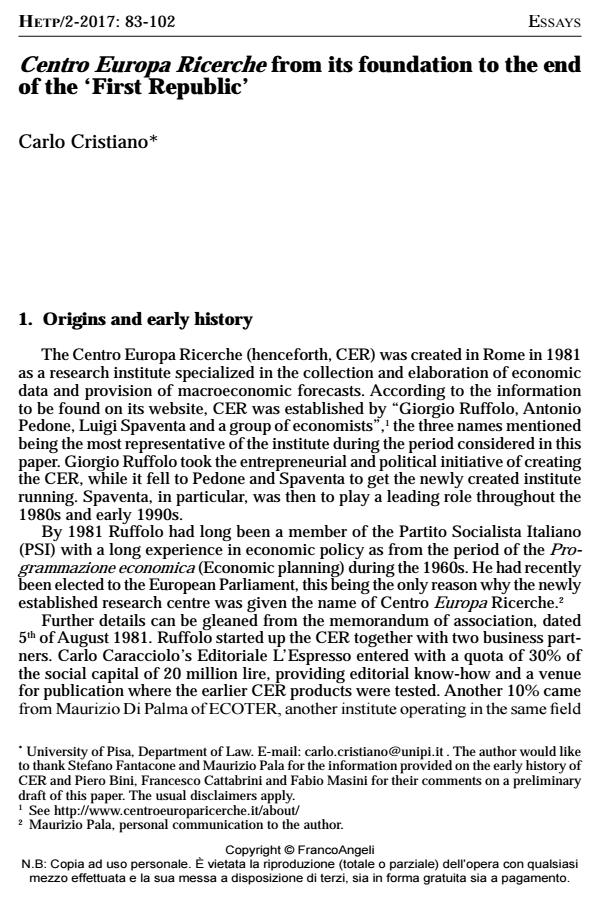Centro Europa Ricerche from its foundation to the end of the ‘First Republic’
Titolo Rivista HISTORY OF ECONOMIC THOUGHT AND POLICY
Autori/Curatori Carlo Cristiano
Anno di pubblicazione 2017 Fascicolo 2017/2
Lingua Inglese Numero pagine 20 P. 83-102 Dimensione file 257 KB
DOI 10.3280/SPE2017-002005
Il DOI è il codice a barre della proprietà intellettuale: per saperne di più
clicca qui
Qui sotto puoi vedere in anteprima la prima pagina di questo articolo.
Se questo articolo ti interessa, lo puoi acquistare (e scaricare in formato pdf) seguendo le facili indicazioni per acquistare il download credit. Acquista Download Credits per scaricare questo Articolo in formato PDF

FrancoAngeli è membro della Publishers International Linking Association, Inc (PILA), associazione indipendente e non profit per facilitare (attraverso i servizi tecnologici implementati da CrossRef.org) l’accesso degli studiosi ai contenuti digitali nelle pubblicazioni professionali e scientifiche.
The Centro Europa Ricerche (CER) was created in Rome in 1981 by Giorgio Ruffolo in collaboration with Antonio Pedone, Luigi Spaventa and a few others. Although very close to the Partito Socialista Italiano (PSI), CER was frequently very critical of the governments in which the PSI took part. While supporting successive reforms of the scala mobile, CER was highly critical of the budgetary policy, with a rapid shift of emphasis from the insufficient and unequal revenues to the need for structural spending cuts from 1983 onwards. Parallel to this ran the analysis of Italian industries and their outlook. While pointing to slow growth of productivity and scant innovation as the main problems of Italian industry, CER lamented the lack of an industrial policy and did not share the Bank of Italy view on the effects of the central bank exchange rate management within the EMS. While the central bank considered it possible to stimulate organisational and technological innovation by means of an overvalued lira, CER denounced the negative effects of this policy on employment. At a later stage, CER also began to view the growing size of the tertiary sector with increasing concern. The situation emerging at the end of the 1980s was that workers laid off from the exporting sectors were finding employment in the less competitive tertiary sector, thus producing an upward pressure on prices which generated inflation and reduced the competitiveness of the entire economy. In response to this, CER proposed several reforms. The reforms proposed, and the arguments supporting them, to some extent anticipated the kind of reformism that would prevail at a later stage, when Italy decided to enter the EMU. However, the kind of reformism proposed at CER from 1982 to 1992 was not based on the idea that an external constraint ought to be imposed on a recalcitrant country. What CER was proposing was an autonomous process of reform, opposed to any external constraint à la Maastricht.
Parole chiave:Centro Europa Ricerche, think tank, Public finance, monetary policy, industrial policy.
Jel codes:B2, H6
- An intellectual boost for Italy’s Europeanisation: the contribution of the influential think tanks Arel and Nomisma (1978–1993) Luca Sandonà, in The European Journal of the History of Economic Thought /2021 pp.324
DOI: 10.1080/09672567.2020.1817118
Carlo Cristiano, Centro Europa Ricerche from its foundation to the end of the ‘First Republic’ in "HISTORY OF ECONOMIC THOUGHT AND POLICY" 2/2017, pp 83-102, DOI: 10.3280/SPE2017-002005